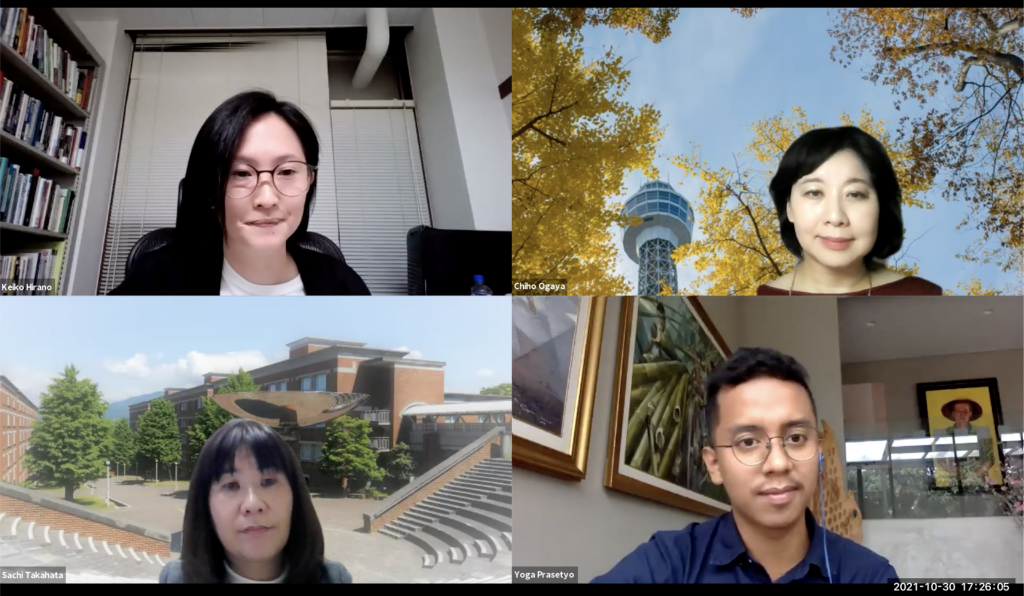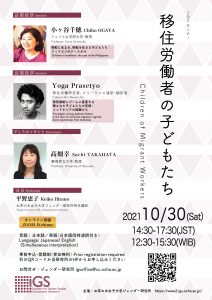At the margin of the global care chain, children of migrant workers face various difficulties. In this seminar, Yoga Prasetyo and Professor Chiho Ogaya gave a lecture about the Indonesian and Filipino cases. Professor Sachi Takahara also joined in the discussion.
First, Yoga Prasetyo shared his personal story as a left-behind child. He was brought up by his uncle and aunt in Indonesia while his mother migrated to work in Singapore. He questioned why left-behind children must face so many challenges to be able to join their migrant parents in the destination. Then he introduced Singapore’s selectively restrictive migration policies which categorize migrant workers depending on their skills. Among three permissions, the “Work Permit,” issued to low-skilled migrant workers, regulates not only having a family and applying for citizenship but also inviting family members to Singapore from their home country. While Singapore needs low-paid migrant workers for economic growth, it also labels them as socially and politically unwanted labor and has “forced” transnational parenting. Under these circumstances, many children are not allowed to live with their parents and are left behind in their home countries. In Indonesia, there is no reliable data about left-behind children and few legal protections. Some studies show that there are many issues such as providing parenting for children, their economic and legal vulnerabilities, and psychosocial well-being. In conclusion, Prasetyo introduced some Indonesian initiatives that provide social support for left-behind children and their caregivers. These included the Migrant Village (Desmigratif), and a community parenting module.
Next, Chiho Ogaya gave a lecture on the experiences and difficulties “Children in mobilities” have. Traditionally migration studies have treated child migrants as “dependents” or “belongings” in contrast to adult migrants. Therefore, Ogaya emphasized the need to pay attention to children’s “lived experiences” and recognize them as having agency. Ogaya also mentioned that children in mobilities are not monolithic and divided into various categories such as “left-behind children,” “children who move into the country where their parents migrate,” and children who are “born out of place.” They face many challenges to be accepted since they are often not expected to be a member of society. Furthermore, family reunification creates a significant burden on parents and children. Introducing the case study of a Filipino family, Ogaya noted that migrant children have to adapt not only to family reunification and the host society simultaneously but also to unique experiences that their parents do not have. In conclusion, Ogaya emphasized that we need more perspectives in terms of children and youth in mobilities, not only as the object of assimilation or migrant children but also as gender perspectives.
After the two lectures, Sachi Takahata commented that both speakers mentioned the vulnerabilities of women and children and referred to the absence of migrant workers’ voices in the policy-making process and understanding of people who are forced to move. Then she asked Yoga about his personal experiences of building trust between his mother and relatives, and the sustainability of community parenting in Indonesia. To Ogaya, Takahata asked how she found the difficulties in researching children in mobilities and what she thought of adults’ responsibilities to them. There were also many questions from participants about Japanese government efforts and support for migrant children. Answering these questions, Yoga mentioned that Desmigratif plays an important role in empowering children. Takahata introduced some cases in which a Japanese municipality provides international children with public support, and Ogaya said that the central government has started to support them.

In conclusion, it was discussed whether it is “usual” that global capitalism creates left-behind children. Three of the presenters mentioned that it is not “usual” and that is why it is necessary to criticize current situations, and at the same time to respect children’s lives.
Reported by Mami Takahashi
(Ph.D. student, Ochanomizu University)
|
【Date/Time】30 October, 14:30–17:40 |


